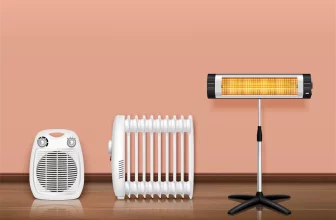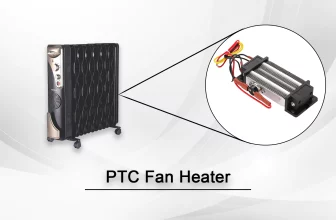
Before delving into the details of oil-filled heaters, it’s essential to understand both their advantages and disadvantages. Let’s explore the pros and cons of oil-filled radiators to help you make an informed decision for your home heating needs.
But before we proceed with more information, let’s begin by understanding what an oil-filled heater essentially is.
What is an Oil-Filled Heater?
An oil-filled heater, also called an oil-filled radiator, is a kind of electric space heater that uses oil to produce warmth. It looks a bit like old-fashioned radiators. Inside, it has a special kind of oil. It works by using an electric heating element at the bottom to warm up the oil. As the oil gets hot, it moves through the heater’s metal columns naturally, making the metal warm and giving off heat into the room.
One great thing about these heaters is that the oil can hold a lot of heat. That means even when you turn the heater off or set it to a lower temperature, it will still give off warmth for a while.
Pros of Oil-Filled Heaters:
Before making a purchase, you should read about the advantages of oil-filled heaters.
Ease of Use and Mobility: Oil heaters are straightforward to use and easy to move around, thanks to their portability.
Plug-and-Play: Simply plug them into an electrical outlet, and they will efficiently start heating your space.
Extended Heating: These heaters continue to provide warmth even after being turned off, acting as a heat reservoir.
Energy Efficiency: Oil-filled heaters are known for their energy efficiency, helping you save on heating costs.
Ideal for Large Spaces: They are well-suited for effectively heating large rooms and spaces.
Heat Reservoir: Oil-filled radiators do not cool down immediately after being turned off, maintaining a comfortable room temperature.
No Oxygen Depletion or Humidity Reduction: They do not deplete oxygen or reduce humidity levels, making them safe and comfortable for extended use.
Safety: Oil heaters are designed with safety in mind, as their surfaces do not become dangerously hot, ensuring child safety.
Low-Cost Maintenance: Maintenance expenses are minimal, contributing to their cost-effectiveness.
360-Degree Heating: These heaters distribute heat evenly throughout the space, ensuring uniform warmth.
Suited for Enclosed Spaces: Oil-filled radiators are best suited for closed rooms or areas where consistent heating is required.
User-Friendly: They are user-friendly and require minimal effort to operate.
Air Quality Maintenance: Oil-filled radiators do not dry out the room’s air, maintaining a comfortable humidity level.
Silent Operation: Unlike some other electric heaters, they operate quietly, ensuring a peaceful environment.
Easy Maintenance and Cleaning: Cleaning and maintaining oil-filled heaters is a hassle-free process.
Cons of Oil-Filled Radiators:
Slow Heating: These heaters take some time to warm up an entire room, which may not be suitable for those seeking rapid heat.
Bulkier Build: Oil-filled radiators tend to have a bulkier and heavier design compared to other heater types.
High Power Consumption: They can consume a significant amount of electricity, with some models reaching up to 4000 watts.
Limited for Large Spaces: A single oil-filled heater may not be sufficient to effectively heat a very large room, and you may require multiple units.
Higher Upfront Cost: Oil-filled heaters are generally more expensive initially when compared to infrared and quartz heaters.
Before making your purchase, consider these pros and cons to determine if an oil-filled radiator aligns with your heating requirements and preferences. Additionally, refer to the Buying Guide for Oil-Filled Heaters for more detailed information on selecting the right heater for your needs.
If you want to read a comprehensive buying guide that shows you how to find the best oil-filled heater in India, you should read the complete buying guide.
Also read,
- Choosing Between an Oil Room Heater and an Electric Heater: Which Is Best for You?
- Buying Guide for Room Heater
FAQ
How do oil-filled heaters work, and what makes them energy efficient?
Are oil-filled heaters safe to use in bedrooms or nurseries?
Can oil-filled heaters replace central heating systems in larger spaces?
How do I maintain and clean an oil-filled heater for optimal performance?
Final Words
Oil-filled heaters offer significant advantages, including efficient heat retention, consistent warmth, and quiet operation. However, they are not without their drawbacks, such as slower initial heating times and potential bulkiness. When choosing a heating solution, it’s essential to consider these advantages and disadvantages to determine if an oil-filled heater is the right choice for your needs.








